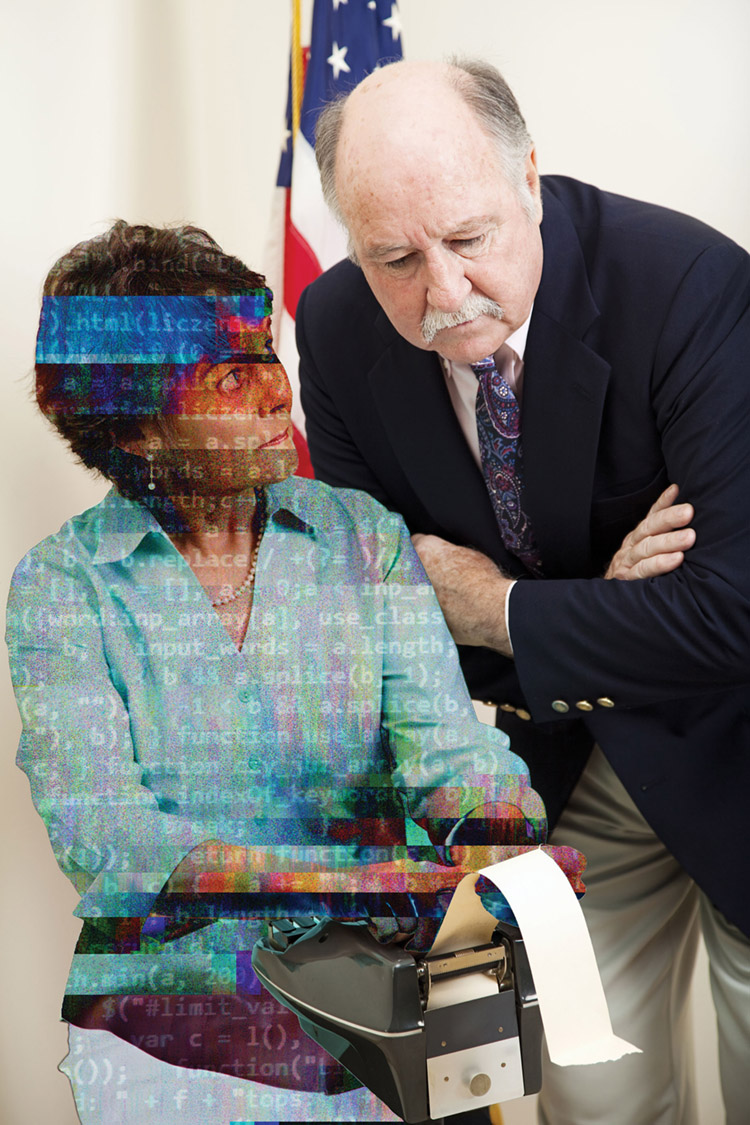Will court reporting undergo a pandemic shift?

Photo illustration by Sara Wadford/Shutterstock
The need for social distancing has forced every industry to rethink how it operates and seek creative ways to conduct business. Obviously, the courts provide an essential service, but COVID-19 may have dealt a huge blow to court reporters as court systems reconsider how they conduct proceedings that previously required people to gather together in close quarters.
As court proceedings take a more unorthodox approach, the transcription process also is changing. In October 2019, the National Court Reporters Association reported a shortage of 5,000 court reporters in the U.S. Meanwhile, before the pandemic, the U.S. Bureau of Labor Statistics projected at least a 7% increase in demand through 2028—a faster growth rate than the average for all U.S. occupations.
Remote video platforms and artificial intelligence technology have emerged as two solutions to address both the shortage and the need for social distancing. “The pandemic crisis we are experiencing is likely to generate an unprecedented backlog in the courts,” says Tony Donofrio, chief technology officer at Veritext Legal Solutions, a national court reporting agency. “There will be no choice but to move forward with well-proven audio and transcription technologies and services to meet the need, and we expect to see rapid adoption there.”
He identifies two problems that the legal community faces: ensuring the unimpeachable validity and certifiable accuracy of the record, and ensuring the confidentiality and privacy of the contents of the record throughout the chain of custody. He believes that AI-augmented transcription tools are more than capable of addressing both of those issues.
Tony Sirna, senior customer success manager at AI transcription and captioning company Verbit, adds: “AI transcription has the potential to help court systems with their chronic backlogs by filling in the gaps where there aren’t enough court reporters present to ensure the speedy delivery of justice.”
Out of court
The potential rise in AI-enabled transcription underscores another reality in today’s post-COVID-19 world: Remote proceedings are becoming more commonplace.
“I haven’t attended an in-person litigation event in over 60 days,” Chelsie M. Lamie, a civil trial lawyer in Clearwater, Florida, said in May. “Since COVID-19, things have obviously changed, and I have done depositions by Zoom, a mediation by Zoom and numerous telephonic hearings.”
Her view is seconded by Michael G. Romano of Romano Law in Beaverton, Oregon.
“Amidst all this COVID-19 and stay-at-home business, I did my first deposition via Zoom a few weeks ago, and I don’t think I’ll ever go back to in-person depositions because it was so convenient,” Romano said in May.
Digital court reporting and AI technology also provide other benefits. “Typewritten transcripts of depositions are quite expensive, and I’ve had clients complain that the cost of actually transcribing a deposition done by a stenographer was more expensive than my hourly rate for actually conducting the deposition,” Romano says.
As for the courts, Romano says it’s a no-brainer for them to switch to an AI-based system for transcription. “The sheer industrial volume of the records they have demands that there be some new way to process all that content.”
Concerns about AI
Sirna believes there has been a degree of resistance from court reporters.
“The court reporting industry is staid and established, and it has been part of delivering proceedings from the legal process for a very long time,” Sirna says. “They feel the technology will take their jobs or decrease demand, but that’s not necessarily the case.”
But Karen Renee, president of eCourt Reporters in Burlington, Wisconsin, a company that allows attorneys to schedule and hire freelance court reporters and legal videographers across the country, disagrees and argues that while they embrace technology, they have concerns with how it is used. “I do agree that court reporters are pushing back on the means of recording legal proceedings, as they know firsthand the challenges and inefficiencies that arise.”
In fact, one concern with AI-driven transcription is whether it can be as accurate as a court reporter. But Sirna says Verbit uses an advanced software that identifies legal terms and cancels out the factors that could reduce audio quality. “The transcripts are also reviewed and edited online by professionals to ensure accuracy.”
Human editors are great, but what happens if there are problems during a legal proceeding?
“I have seen some court reporters stop to clarify a spelling, advise the deponent that their answer was inaudible, or even ask for clarification if the noise the deponent uttered was affirmative or not,” Lamie says.
While she’s in favor of developing and using AI-driven technologies within the legal community, Lamie says the idea of replacing a court reporter with AI technology, such as voice to text or video to text, gives her pause. “Every human court reporter is different, but I’ve sat through some depositions where the deponent’s speech is extremely hard to understand, and it’s only from context clues that the word the deponent is saying is ‘crash’ versus ‘brash’ versus ‘gash.’”
Her view is shared by Reesa Parker, co-founder of Dallas-based Goucher Parker Spivey, which augments traditional court reporting with remote reporters. “The next logical step is to use a virtual platform to take reporters wherever they are and put them where they are needed, using AI as an aid to create and produce verbatim transcripts.” But Parker says AI has not yet advanced to the point where it can replace a court reporter. “The presence of a reporter—a human being—gives attorneys and judges a comfort that AI does not yet provide, because verbatim transcripts play a critical role in litigation, court proceedings and the appellate process.”
Parker believes that right now, remote reporters are the most viable option.
Renee also thinks court reporters are still superior to AI. She believes voice recording technology is getting better, but she says it does not compare to a live court reporter in legal proceedings.
“Litigation is adversarial, which means arguments ensue, and overspeak is common; as the unbiased person in any deposition, the court reporter is the person in the room to gain control of the situation to ensure a clean transcript.” She welcomes the additional technology if the need or demand for recording legal proceedings becomes prevalent.
“But given what I’ve seen firsthand, should I find myself in litigation, I would demand my legal representation utilize a live court reporter for all legal proceedings.”
This story was originally published in the October-November 2020 issue of the ABA Journal under the headline: “Dictating Change? Will COVID-19 cause attorneys and courts to embrace AI-enabled transcription services at the expense of court reporters?”
Clarification
Print and initial versions of Dictating Change?, October-November, should have clarified that Michael G. Romano’s statement about his first Zoom deposition was made in May.
Write a letter to the editor, share a story tip or update, or report an error.


